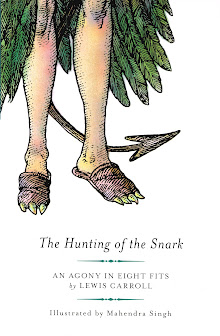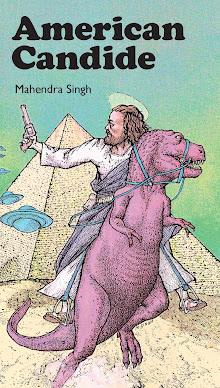
My Hunting of the Snark as it exists so far — the Preface and Fits 1 and 2 — can now be downloaded in an easy-to-read PDF here.
Meanwhile, back at the ranch …
Whenever asked what the Snark meant, Lewis Carroll always replied : I don’t know*. Huzzah for these cheeky Victorians and their tautological transparencies in which the meaning is the meaning, they never cease to baffle the small-minded and delight the light-hearted! But I digress …
Should we ask the Snark what Lewis Carroll meant? The Snark’s reply is, of course, the entire text of The Hunting of the Snark, excluding the Preface. Since the Snark and Carroll are ultimately the same, the Carrollian answer of one word and the Snarkian answer of 5,065 words are ultimately equivalent, an astonishing feat of commutative compression and expansion!
This business of looking into the wrong end of the telescope is the essential premise of protosurrealism, that obscure school of art which has been previously defined here as the 21st-century application of 19th-century answers to 20th-century problems. The protosurrealist telescopes his postmodern Surrealist past into the Victorian intellectual’s expected future, and as his past becomes his future, his nostalgia becomes his anticipation! Nothing is wasted!
The excellent and truly well-read nnyhav has rightfully pointed out the similarities between protosurrealism and ‘pataphysics. The difference lies in purpose : the latter was a strategy of defiance towards the pre-War culture of Europe and a precursor of Surrealism, the former is exactly the same things but 100 years too late.
Protosurrealism, like Pierre Menard writing Don Quixote, has no history or future, it’s always now and its now is always then. For this poor Snark whose very purpose in life was unknown to his creator, what better habitat for him than the pre-anachronism of protosurrealism? At last, the Snark will have a refuge where he can dwell on his comforting memories of the future and look forward to the past he will never have.
_____________________________________________
* I might reply that the Snark means : 'Pataphysics, Adlocutio, Alberto Savinio, Alexandra Xie Kitchin, Alfred Jarry, Andrei Vyshinsky, Aristotle, Arnold Bocklin, Assamese Curry, Atlas Press, Augustus Caesar, Bathing Machines, Benjamin Péret, Blaise Pascal, Boojum Tree, Book of Revelations, Buddhist Stupas, Carl Reiner, Charles Dodgson, Clochetic Rule of Three, Coconino County, Comte de Lautrémont, Constantin Brancusi, Dante Alighieri, Dora Maar, Douglas Adams, Easter Island Moias, Edgar Allan Poe , Edouard Manet, Eileen Agar, Elmer Fudd, Epistemology, Eric Satie, Etymology, Eugène Delacroix, Exquisite Corpse, Flann O'Brien, French Language, Friedrich Nietzsche, George Herriman, George Orwell, Gilbert and Sullivan, Gin-Driven Ink-Pens, Giorgio de Chirico, Golden Eagle Beer, Goon Show, Gustave Flaubert, Hans and Jean Arp, Hans Bellmer, Henri Michaux, Henry Holiday, Heraclitus, Heinz Edelmann, Hieronymus Bosch, His Master's Voice, Igor Stravinsky, Italo Calvino, Jacques-Louis David, Jean Auguste Dominique Ingres, Jean Benoît, Joseph Bonnet, Joseph Welch, Juan Miro, Karl Marx, Kiki de Monparnasse, Krazy Kat, La Guida di Bragia, Leonardo da Vinci, Lord Byron, Louis Aragon, Récamier, Man Ray, Mark Antony, Martin Heidegger, Matthias Grünewald, Max Ernst, Mel Brooks, Michelangelo, Nautch Girls, Nectarines, Old Scratch, Omnium, Orientalism, Oscar Dominguez, Paranoaic-Critical Method, Peter Greenaway, Piero di Cosimo, Plato, Poutine, Procris, Protosurrealism, Père Ubu, Railway Surrealism (Anglo-Italianate), Raphael, Raymond Roussel, René Magritte, Robert Walser, Salvador Dali, Scholasticism, Sebastian Brant, Shakespeare, Sigmund Freud, Sir Alma-Tadema, Sir John Tenniel, Socrates, Stephane Mallarmé, Sylvie and Bruno, The Globe and Mail, The Isle of the Dead, The Line of Beauty, The Number 42, The Rake’s Progress, The School of Athens, The Ship of Fools, The Snark as an Ontological Argument for a Godless Universe, The Temptation of St. Anthony, The Third Policeman, The Yellow Submarine, Théodore Géricault, Turin, Une Semaine de Bonté, V.I. Lenin, Valentine's Day, Vincent van Gogh, W.H. Auden, Walt Whitman, William Hogarth, Witold Gombrowicz and Yves Tanguy.
Some readers may call all of the above just logorrheiac-name-droppings rife with an surfeit of posthumous collaborations (AKA plagiarisms), shot through and through with half-truths, quarter-truths, and even eighth-truths and of course (my personal favorite as an independently impoverished artist), a brazen contempt for the clearly stated wishes of the hapless author, expressed by indulging in a particularly vicious (and Flaubertian) brand of semiotic and typological miscegenation hitherto only seen in the utterly depraved final days of the Roman Empire!
But you can’t say that because I said it first and now I got dibs on it! Plus, all those big words — they could put your eye out!








In duly crediting RRoussel, does not H.-A. Zo deserve passing mention? But for priority's sake, firstly note that Oulipo declared Roussel an anticipatory plagiarist: "Anticipatory plagiarism occurs when someone steals your original idea and publishes it a hundred years before you were born." So Anne Fadiman credits Robert K. Merton in a footnote, but I cannot locate the exact quote; the concept pervades On the Shoulders of Giants (OTSOG for short; now also signifying "a close-knit narrative that pays its respects to scholarship and its dues to pedantry; also, an extremely diversified (and thoroughly parenthesized *) piece of dedicated scholarship.", with the variant 'otsogre' being "a monstrous otsog of frightening aspect" [Hi Adam!]), which I commend to your attention.
ReplyDelete"* and heavily footnoted"
I was unaware of H,-A. Zoe & M. Claumont and I have to say thank you for this invaluable bread-crumb trail ! That single image on the link made every scotch-soaked neuron in my humble arter's brain tingle with genuine delight! The entire project makes me green with envy … here at Festung Schnark, Roussel is at the top of our food pyramid. Although I have to say (as my French improves) it's almost impossible not to create an incessant stream of puns when speaking …
ReplyDeleteI will pass over in silence the Oulipians''s pre-appropriation of my concept of pre-appropriation, stiff upper lip and all that.
The concept of otsog intrigues me greatly. Perhaps we can embellish on it even more, eh? Cue evil laughter!
I have earlier produced a painstaking analysis of shoulder-standing; please permit me to point it out to you.
ReplyDeleteThanks, Ben, for the very good humerostitation (sic?) analysis of Otsog.
ReplyDeleteThis does beg the question … whither Polyphemous? Whose shoulders could he stand upon? He'll just bump his head on the roof of his darkened Platonic cave and get a headache. Would it be an Ideal headache?
And who said modern youth was idling away its time in useless fancification? Huzzah for youth!
Postsnarkism
ReplyDelete—for Jorge Luis Borges
This business of being snarky about the past is the essential premise of postsnarkism, that obscure school of art which has been previously defined as the postmodern 21st-century application of 21st-century snarkism to modernist 20th-century problems. The modernist snarkism past highlighted by the ultra-snarky Sapphic Modernism of Djuna Barnes & Mina Loy provokes a nostalgia with postmodern snarkism professionals & aspiring pedagogues & snarky autodidacts today because of certain modernist Parisian parochial postlust presumptions which are simply impossible to leave alone, i.e. virgin & snark-free.
Postsnarkism, like Pierre Menard writing Don Quixote, is a new technique, the halting and rudimentary art of POMO snarkism: this new technique is that of the deliberate snark and the erroneous attribution. This technique, whose applications are infinite, prompts us to go through the Odyssey as if it were posterior to the Adenoid and the book Fanny Hill: Memoirs of a Woman of Pleasure of John Cleland as if it were by Madame Larry Craig. This technique fills the most placid works with naughty adventure. To attribute Peyton Place to Mark Foley or Lolita to Bill O’Reilly, is this not a sufficient renovation of Literature’s most exquisite erotically snarky possibilities?
Excellently put, anonymous!
ReplyDeletePostsnarkism, is, of course, preboojumism, which is itself, postantefacto après vie.
Boojumism itself will be a trifle, a mere canard. The one to watch out for is postboojumism.
Postboojumism is the point in time in which our descendants, standing upon the shoulders of the only giants left available to them — ourselves — will see nothing at all.
Thank you, Mr. Singh,
ReplyDeleteI couldn't have said it better
myself.......
This comment has been removed by the author.
ReplyDeletesonic 'pataphysics:
ReplyDelete'One explanation is that it's incredibly difficult to explain'
'You are not expected to understand this'